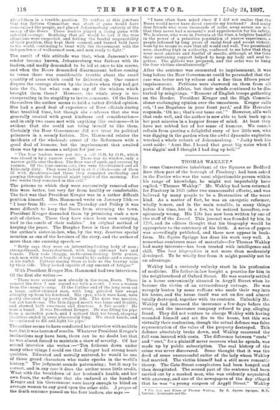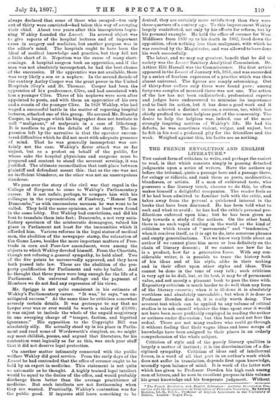THOMAS WAKLE Y.*
IF some Conservative inhabitant of the Squares or Bedford Row (then part of the borough of Finsbury) had been asked in the Forties who was the most objectionable person within his range of knowledge, he might not improbably have replied, "Thomas Walley." Mr. Wakley had been returned for Finsbury in 1835 (after two unsuccessful efforts), and was believed by many people to be a. Destructive of the worst kind. As a matter of fact, he was an energetic reformer, wholly honest, and in the main sensible, in many things before his time, but in a few, to be noticed hereafter, con- spicuously wrong. His Life has now been written by one of the staff of the Lancet. This journal was founded by him in 1795, and its editors thought that his biography would be appropriate to the centenary of his birth. A series of papers was accordingly published, and these now appear in book- form. Mr. Squire Sprigge has done his work very well. A somewhat cumbrous mass of materials—for Thomas Walley had many interests—has been treated with intelligence and skill. The Nes biographica is not more than moderately developed. To be wholly free from it might possibly not be an advantage.
Walley had a curiously unlucky start in his professicos of medicine. His father-in-law bought a practice for him in the neighbourhood of Oxford Street. He was scarcely settled in a house conveniently situated in Argyll Street when he became the victim of an extraordinary outrage. He was savagely beaten by some ruffians who made their way into his house, and the house itself was set on fire and almost totally destroyed, together with its contents. Unluckily Mr. Walley had increased the insurance a few days before the event, and the insurance company refused to pay, alleging fraud. They did not venture to charge Walley with having wounded himself and set fire to the house, but this was virtually their contention, though the actual defence was false representation of the value of the property destroyed. This defence absolutely broke down, and Walley recovered the full sum insured with costs. The difference between "costs" and "cost," for a plaintiff never recovers what he spends, was made up by public subscription. The real history of the crime was never discovered. Some thought that it was the deed of some unsuccessful suitor of the lady whom Walley had married. The victim himself had a still more romantic theory. The Cats Street conspirators had been hanged and then decapitated. The second part of the sentence had been carried out by a masked man, who was evidently acquainted with anatomy, and one of the newspapers of the day alleged that he was "a young surgeon of Argyll Street." Walley • The Life and Times of Thomas Wakley. By B. Squire Bprigge, IL B. London : Long:Dana and Cu. always declared that some of those who escaped—ten only out of thirty were convicted—had taken this way of avenging their chief. About two years after this inauspicious begin- ning W akley founded the Lancet. Its avowed object was to give reports of the hospital lectures and of important cases in surgery and medicine, but another purpose was in the editor's mind. The hospitals ought to have been the ideal of medical knowledge and practice, but they fell not a little short of it. Nepotism was the cause of many short- comings. A hospital surgeon took an apprentice, and if the man was not absolutely incompetent, he had the best chance -of the succession. If the apprentice was not available, there was very likely a son or a nephew. In the second decade of the century Astley Cooper was the great power in the United Hospitals (Guy's and St. Thomas). Cooper had been the apprentice of his predecessor, Clive, and had associated with him a younger Clive. Three of his nephews were soon after appointed to posts, and with them an apprentice of his own and a cousin of the younger Clive. In 1828 Wakley, who had waged a successful battle in the matter of reporting hospital lectures, attacked one of this group. He accused Mr. Bransby Cooper, in language which his biographer does not hesitate to
"malignant," of malpraxis in a case of lithotomy. It is needless to give the details of the story. The im- pression left by the narrative is that the operator encoun- tered difficulties which he did not meet with adequate presence of mind. That he was generally incompetent was cer- tainly not the case. Wakley's fierce attack was so far unjust, but as a protest on behalf of the public, for whose sake the hospital physicians and surgeons must be prepared and content to stand the severest scrutiny, it was justified. The ultimate reconciliation that took place between plaintiff and defendant meant this : that as the one was not an inefficient blunderer, so the other was not an unscrupulous slanderer.
We pass over the story of the civil war that raged in the College of Surgeons to come to Wakley's Parliamentary career. It is not unfair, perhaps, to compare him with his colleague in the representation of Finsbury, "Honest Tom Duncombe," as with unconscious sarcasm he was wont to be called. They held the same opinions, or at least were found in the same lobby. But Wakley had convictions, and did his best to translate them into fact ; Dancombe, a not very satis- factory specimen of the aristocratic demagogue, valued his place in Parliament not least for the immunities which it afforded him. Various reforms in the legal status of medical men, the abolition of the newspaper stamp, the relaxation of the Game Laws, besides the more important matters of Free. trade in corn and Poor-law amendment, were among the objects to which Wakley devoted himself. From the Chartists, though not refusing a general sympathy, he held aloof. Two of the five points he unreservedly approved, and they have both passed into law. These are the abolition of the pro- perty qualification for Parliament and vote by ballot. And he thought that three years were long enough for the life of a Parliament. On universal suffrage and the payment of Members we do not find any expression of his views.
Mr. Sprigge is not quite consistent in his estimate of Wakley's Parliamentary career. "It was," he says, "an un- mitigated success." At the same time he criticises somewhat severely certain details. It was grotesque to say that no lawyer ever was or ever would be worth a salary of 23,000; it was unjust to include the whole of the unpaid magistracy in one sweeping charge of "temper, faction, and bigotted ignorance." His opposition to the Copyright Bill was absolutely silly. He actually stood up in his place in Parlia- ment and read some of Wordsworth's simplest, or, we might say most childish, poems, and argued that literature, for his contention went logically as far as this, was such poor staff that it did not deserve legal protection.
On another matter intimately connected with the public welfare Wakley did good service. From the early days of the Lancet he had contended that the office of coroner ought to be held by an expert in medicine. This statement is not quite so axiomatic as he thought. A highly trained legal intellect would be equal to the duties of the office, and would probably discharge them better than the average practitioner of medicine. But such intellects are not forthcoming when they are wanted. Practically, Wakley's contention was for the public good. If inquests still leave something to be desired, they are certainly more satisfa3tory than they were three-quarters of a century ago. To this improvement Wakley largely contributed, not only by his efforts for reform, but by his personal example. He held the office of coroner for West Middlesex from 1839 up to his death in 1862, lived down the opposition, often nothing less than malignant, with which he was received by the Magistrates, and was allowed to have done his work successfully.
The latest, and we may say greatest, benefit that he did to society was the Lancet Sanitary Analytical Commission. Dr. Arthur Hill Hassall was the Commissioner. His first article appeared in the Lancet of January 4th, 1851, and was succeeded by a series of fearless exposures of a practice which was then almost universal. The figures are simply astonishing. Oat of thirty-four coffees only three were found pure ; among forty-two samples of mustard there was not one. The action of the law has not been undisturbed ; professional experts and judges have endeavoured to minimise its importance and to limit its action, but it has done a good work and it it has achieved a distinct success, a success, too, which has chiefly profited the most helpless part of the community. The desire to help the helpless was, indeed, one of the most strongly inspiring motives of Wakley's life. He had his defects, he was sometimes violent, vulgar, and unjust, but he felt in his soul a profound pity for the friendless and the weak. Weighed against this, his faults are as nothing.



































 Previous page
Previous page